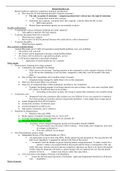Study guide
Mental Health Law
- Vak
- Instelling
- Boek
18 pages worth of notes containing lecture notes, summary of academic literature and relevant case law and legislation. EXCEPTION to the principle of autonomy. Relevant legislation: Mental Health Act. Considers the policy trends, impacts and solutions to problems associated with mental health law.
[Meer zien]






